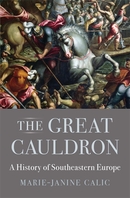New Publication: "The Great Cauldron"
New book on the history of Southeastern Europe by Marie-Janine Calic published with Harvard University Press
22.05.2019
Professor Dr Marie-Janine Calic, Professor of East and Southeast European History at LMU Munich and Principal Investigator of the Graduate School, is author of the new book "The Great Cauldron: A History of Southeastern Europe". The book, published in early June 2019 with Harvard University Press, is a sweeping history of Southeastern Europe, from antiquity to the present, which reveals itself to be a vibrant crossroads of trade, ideas and religions.
Many people think of the Balkans as a region beset by turmoil and backwardness. But from late antiquity to the present it has been a dynamic meeting place of cultures and religions. Combining deep insight with narrative flair, "The Great Cauldron" invites us to reconsider the history of this intriguing, diverse region as essential to the story of global Europe. Marie Janine Calic's ambitious reappraisal expands and deepens our understanding of the ever-changing mixture of peoples, faiths, and civilizations in this much-neglected nexus of empire. The book was translated by Elizabeth Janik.
Marie-Janine Calic is Professor of Eastern and Southeastern European History at Ludwig-Maximilians-Universität and principal investigator of the Graduate School for East and Southeast European Studies in Munich. She served as a political adviser to the Special Coordinator of the Stability Pact for Southeastern Europe in Brussels and for the UN Special Representative for the Former Yugoslavia in Zagreb. She also worked for the International Criminal Tribunal for the former Yugoslavia at The Hague, and the Conflict Prevention Network of the European Commission and Parliament in Brussels. Calic has published and lectured extensively about the Balkans and is a regular commentator on Balkan affairs for the German media.
About the book
Marie-Janine Calic reveals the many ways in which southeastern Europe’s position at the crossroads of East and West shaped continental and global developments. The nascent merchant capitalism of the Mediterranean world helped the Balkan knights fight the Ottomans in the fifteenth century. The deep pull of nationalism led a young Serbian bookworm to spark the conflagration of World War I. The late twentieth century saw political Islam spread like wildfire in a region where Christians and Muslims had long lived side by side. Along with vivid snapshots of revealing moments in time, including Krujë in 1450 and Sarajevo in 1984, Calic introduces fascinating figures rarely found in standard European histories. We meet the Greek merchant and poet Rhigas Velestinlis, whose revolutionary pamphlet called for a general uprising against Ottoman tyranny in 1797. And the Croatian bishop Ivan Dominik Stratiko, who argued passionately for equality of the sexes and whose success with women astonished even his friend Casanova.
Calic, Marie-Janine: The Great Cauldron. A History of Southeastern Europe. Translated by Elizabeth Janik. Cambridge, MA: Harvard University Press, 2019.
736 Pages
ISBN 9780674983922
Hardcover $39.95 · £28.95 · €36.00
Harvard University Press
Cover: © Harvard University Press
Reviews
“On rare but memorable occasions, a book comes along that fills a vacuum one did not know existed. In an era when nationalist stereotypes and conflicts dominate, Calic tells a totally absorbing, transformative story of the far more significant role of transborder, and even global exchanges of people, ideas, and things that have defined the Balkan Peninsula—from Romania to Albania to Greece—over two thousand years. So much for the myth of a peripheral backwater! Her eloquent narrative tells us much more than the story of southeastern Europe; it also sheds light on our interpretations of contemporary history and our assumptions even beyond Europe.”—Susan L. Woodward, author of Balkan Tragedy
“Calic convincingly and thoroughly shows the Balkans to be a quintessential ‘world region,’ one whose historical character has been decidedly cosmopolitan, diverse, and dynamic. She successfully challenges and overturns the usual assumptions that uncritically reproduce stereotypes of Balkan parochialism and isolationism.”—Edin Hajdarpasic, author of Whose Bosnia?
“There has long been a need for a comprehensive, new history of Europe's controversial quadrant. Calic’s lucid, authoritative account, from ancient times and ethnic origins to warfare and recovery since 1989, is a stellar example of the new global history. She sees southeastern Europe as a cauldron in which its peoples and polities are stirred together with Europe’s longest and largest set of transnational and transcultural influences. Throughout, she shows how these interrelations belied any separate Balkan definition of this all-too-accessible corner of the continent.”—John R. Lampe, author of Yugoslavia as History


